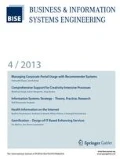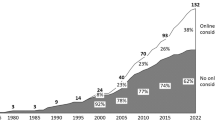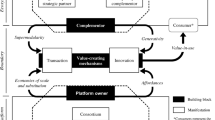Abstract
With the ever-growing popularity of sharing economy platforms, complementors increasingly face the challenge to manage their reputation on different platforms. The paper reports the results from an experimental online survey to investigate how and under which conditions online reputation is effective to engender trust across platform boundaries. It shows that (1) cross-platform signaling is in fact a viable strategy to engender trust and that (2) its effectiveness crucially depends on source–target fit. Implications for three stakeholders are discussed. First, platform complementors may benefit from importing reputation, especially when they have just started on a new platform and have not earned on-site reputation yet. The results also show, however, that importing reputation (even if it is excellent) may be detrimental if there occurs a mismatch between source and target and that, hence, fit is of utmost importance. Second, regulatory authorities may consider reputation portability as a means to make platform boundaries more permeable and hence to tackle lock-in effects. Third, platform operators may employ cross-platform signaling as a competitive lever.




Similar content being viewed by others
Notes
See Zippo’s attempt to market a women’s perfume (Austin 2013); Who would not want to smell like lighter fluid?!
References
Aaker DA, Keller KL (1990) Consumer evaluations of brand extensions. J Mark 54(1):27–41
Abramova O, Krasnova, H, Tan C-W (2017) How much will you pay? Understanding the value of information cues in the sharing economy. In: Ramos I et al (eds) Proceedings of the 25th European conference on information systems, Guimaraes, pp 1011–1028
Airbnb (2017) Does Airbnb perform background checks on members? https://www.airbnb.com/help/article/1308/does-airbnb-perform-background-checks-on-members? Accessed 29 Mar 2019
Akbar P, Mai R, Hoffmann S (2016) When do materialistic consumers join commercial sharing systems. J Bus Res 69(10):4215–4224
Akerlof GA (1970) The market for ‘lemons’: quality uncertainty and the market mechanism. Q J Econ 84(3):488–500
Arikan E, Yilmaz C, Bodur M (2016) Expanding the boundary of brand extensions through brand relationship quality. J Bus Econ Manag 17(6):930–944
Austin C (2013) See the 10 worst brand extensions currently on the market. https://www.businessinsider.com/the-10-worst-brand-extensions-2013-2?IR=T#zippo-the-woman-perfume-2106-votes-10. Accessed 26 Mar 2019
Basoglu KA, Hess TJ (2014) Online business reporting: a signaling theory perspective. J Inf Syst 28(2):67–101
Bolton G, Greiner B, Ockenfels A (2013) Engineering trust: reciprocity in the production of reputation information. Manag Sci 59(2):265–285
Botsman R (2012) The currency of the new economy is trust. https://www.ted.com/talks/rachel_botsman_the_currency_of_the_new_economy_is_trust?language=en. Accessed 27 Sept 2019
Boush DM, Loken B (1991) A process-tracing study of brand extension evaluation. J Mark Res 28(1):16–28
BusinessInsider (2015) Uber’s internal charts show how its driver-rating system actually works. https://www.businessinsider.com/leaked-charts-show-how-ubers-driver-rating-system-works-2015-2?IR=T. Accessed 29 Mar 2019
Campbell C (2019) How China is using ‘Social Credit Scores’ to reward and punish its citizens. https://time.com/collection/davos-2019/5502592/china-social-credit-score/. Accessed 21 June 2019
Chen J, Shen XL (2015) Consumers’ decisions in social commerce context: an empirical investigation. Decis Support Syst 79:55–64
Chen X, Huang Q, Davison RM, Hua Z (2015) What drives trust transfer? The moderating roles of seller-specific and general institutional mechanisms. Int J Electron Commer 20(2):261–289
Dakhlia S, Davila A, Cumbie B (2016) Trust, but verify: the role of ICTs in the sharing economy. In: Ricciardi F, Harfouche A (eds) Information and communication technologies in organizations and society. Springer, Cham, pp 303–311
Dens N, De Pelsmacker P (2010) Attitudes toward the extension and parent brand in response to extension advertising. J Bus Res 63(11):1237–1244
Dimoka A, Hong Y, Pavlou PA (2012) On product uncertainty in online markets: theory and evidence. MIS Q 36(2):395–426
Dohmen T, Falk A, Huffman D, Sunde U, Schupp J, Wagner GG (2011) Individual risk attitudes: measurement, determinants, and behavioral consequences. J Eur Econ Assoc 9(3):522–550
Donath J (2007) Signals in social supernets. J Comput Mediat Commun 13(1):231–251
Dong C, Russello G, Dulay N (2007) Trust transfer in distributed systems. In: Etalle S, Marsh S (eds) IFIP international federation for information processing, vol 238. Springer, Boston, pp 17–29
Dunham B (2011) The role for signaling theory and receiver psychology in marketing. In: Saad G (ed) Evolutionary psychology in the business sciences. Springer, Heidelberg, pp 225–256
Eisenmann T, Parker G, Van Alstyne MW (2006) Strategies for two-sided markets. Harv Bus Rev 84(10):92–101
Eisenmann TR, Parker G, Van Alstyne MW (2008) Opening platforms: how, when and why? In: Gawer A (ed) Platforms, markets and innovation. Edward Elgar, Northampton, pp 131–162
Ert E, Fleischer A, Magen N (2016) Trust and reputation in the sharing economy: the role of personal photos in Airbnb. Tour Manag 55(1):62–73
EU (2017) Exploratory study of consumer issues in online peer-to-peer platform markets. http://ec.europa.eu/newsroom/just/item-detail.cfm?item_id=77704. Accessed 26 Mar 2019
European Parliament (2016) General data protection regulation. Council of the European Union. http://data.consilium.europa.eu/doc/document/ST-5419-2016-INIT/en/pdf. Accessed 23 Mar 2019
Faul F, Erdfelder E, Lang A-G, Buchner A (2007) G* Power 3: a flexible statistical power analysis program for the social, behavioral, and biomedical sciences. Behav Res Methods 39(2):175–191
Filippas A, Horton JJ, Golden JM (2018) Reputation in the long-run. SSRN working paper 3103688. https://papers.ssrn.com/sol3/papers.cfm?abstract_id=3103688. Accessed 27 Sept 2019
Gal-Oz N, Grinshpoun T, Gudes E (2010) Sharing reputation across virtual communities. J Theor Appl Electron Commer Res 5(2):1–25
Gefen D (2000) E-commerce: the role of familiarity and trust. Omega 28(6):725–737
Gefen D (2002) Reflections on the dimensions of trust and trustworthiness among online consumers. ACM SIGMIS Database 33(3):38–53
Gefen D, Straub DW (2004) Consumer trust in B2C e-commerce and the importance of social presence: experiments in e-products and e-services. Omega 32(6):407–424
Gefen D, Straub DW, Boudreau MC (2000) Structural equation modeling and regression: guidelines for research practice. Commun Assoc Inf Syst 4(1):1–77
Ghose A (2009) Internet exchanges for used goods: an empirical analysis of trade patterns and adverse selection. MIS Q 33(2):263–291
Graef I (2016) Blurring boundaries of consumer welfare: how to create synergies between competition, consumer and data protection law in digital markets. SSRN working paper 2881969. https://papers.ssrn.com/sol3/papers.cfm?abstract_id=2881969. Accessed 27 Sept 2019
Grinshpoun T, Gal-Oz N, Meisels A, Gudes E (2009) CCR: a model for sharing reputation knowledge across virtual communities. In: International conference on web intelligence and intelligent agent technology, Thessaloniki, pp 34–41
Gutt D, Kundisch D (2016) Money talks (even) in the sharing economy: empirical evidence for price effects in online ratings as quality signals. In: Proceedings of the international conference on information systems, Dublin. https://aisel.aisnet.org/icis2016/Crowdsourcing/Presentations/3/. Accessed 27 Sept 2019
Gutt D, Neumann J, Zimmermann S, Kundisch D, Chen J (2019) Design of review systems: a strategic instrument to shape online reviewing behavior and economic outcomes. J Strateg Inf Syst 28(2):104–117
Hair JFJ, Black WC, Babin BJ, Anderson RE (2010) Multivariate data analysis: a global perspective. Pearson, Upper Saddle River
Han H, Koo C, Chung N (2016) Implication of the fit between Airbnb and host characteristics: a trust-transfer perspective. In: Proceedings of the ICEC 2016, Suwon, pp 1–6
Havakhor T, Soror AA, Sabherwal R (2016) Diffusion of knowledge in social media networks: effects of reputation mechanisms and distribution of knowledge roles. Inf Syst J 28(1):104–141
Hawlitschek F, Teubner T, Adam MTP, Borchers N, Möhlmann M, Weinhardt C (2016a) Trust in the sharing economy: An experimental framework. In: Proceedings of the international conference on information systems, Dublin. https://aisel.aisnet.org/icis2016/Crowdsourcing/Presentations/21/. Accessed 27 Sept 2019
Hawlitschek F, Teubner T, Weinhardt C (2016b) Trust in the sharing economy. Swiss J Bus Res Pract 70(1):26–44
Hendrikx F, Bubendorfer K, Chard R (2015) Reputation systems: a survey and taxonomy. J Parallel Distrib Comput 75(1):184–197
Hesse M, Teubner T (2019) Reputation portability: quo vadis? Electron Mark 29(5):1083–1119
Hong IB, Cho H (2011) The impact of consumer trust on attitudinal loyalty and purchase intentions in B2C e-marketplaces: intermediary trust vs. seller trust. Int J Inf Manag 31(5):469–479
Jarvenpaa SL, Tractinsky N, Vitale M (2000) Consumer trust in an internet store. Inf Technol Manag 1(1):45–71
Jøsang A (2007) Trust and reputation systems. In: Aldini A, Gorrieri R (eds) Foundations of security analysis and design, vol IV. Springer, Heidelberg, pp 209–245
Jøsang A, Ismail R, Boyd C (2007) A survey of trust and reputation systems for online service provision. Decis Support Syst 43(1):618–644
Kathuria V, Lai JC (2018) User review portability: why and how? Comput Law Secur Rev 34(6):1291–1299
Kelley HH (1973) The processes of causal attribution. Am Psychol 28(2):107–128
Kim DJ (2014) A study of the multilevel and dynamic nature of trust in e-commerce from a cross-stage perspective. Int J Electron Commer 19(1):11–64
Kim H-W, Xu Y, Koh J (2004) A comparison of online trust building factors between potential customers and repeat customers. J Assoc Inf Syst 5(10):392–420
Kim DJ, Ferrin DL, Rao HR (2008) A trust-based consumer decision-making model in electronic commerce: the role of trust, perceived risk, and their antecedents. Decis Support Syst 44(1):544–564
Kokkodis M, Ipeirotis PG (2016) Reputation transferability in online labor markets. Manag Sci 62(6):1687–1706
Lim K, Sia C, Lee M, Benbasat I (2006) Do I trust you online, and if so, will I buy? An empirical study of two trust-building strategies. J Manag Inf Syst 23(2):233–266
Lu Y, Zhao L, Wang B (2010) From virtual community members to C2C e-commerce buyers: trust in virtual communities and its effect on consumers’ purchase intention. Electron Commer Res Appl 9(4):346–360
Ma X, Hancock JT, Mingjie KL, Naaman M (2017) Self-disclosure and perceived trustworthiness of Airbnb host profiles. In: Proceedings of the ACM conference on computer supported cooperative work and social computing, Portland, pp 1–13
McKnight DH, Choudhury V, Kacmar C (2002) Developing and validating trust measures for e-commerce. Inf Syst Res 13(3):334–359
Mishra DP (1995) Signaling and monitoring strategies of service firms. Adv Serv Mark Manag 4(1):249–288
Mittendorf C (2017) The implications of trust in the sharing economy: an empirical analysis of Uber. In: Bui T (ed) Proceedings of the Hawaii international conference on system sciences, Puaka, pp 5837–5846
Mittendorf C, Berente N, Holten R (2019) Trust in sharing encounters among millennials. Inf Syst J 29(5):1083–1119
Otto L, Angerer P, Zimmermann S (2018) Incorporating external trust signals on service sharing platforms. In: Proceedings of the 26th European conference on information systems. https://aisel.aisnet.org/ecis2018_rp/78/. Accessed 27 Sept 2019
Pavlou PA, Gefen D (2004) Building effective online marketplaces with institution-based trust. Inf Syst Res 15(1):37–59
Pingel F, Steinbrecher S (2008) Multilateral secure cross-community reputation systems for internet communities. In: Furnell S et al (eds) Trust, privacy and security in digital business. Springer, Heidelberg, pp 69–78
PwC (2016) How the sharing economy is reshaping business across Europe. https://www.pwc.com/gr/en/publications/specific-to-all-industries-index/future-of-the-sharing-economy-in-europe-2016.html. Accessed 29 Mar 2019
Resnick P, Zeckhauser R (2002) Trust among strangers in internet transactions: Empirical analysis of eBay’s reputation system. In: Baye M (ed) The economics of the internet and e-commerce. Bingley, Emerald, pp 127–157. https://doi.org/10.1016/S0278-0984(02)11030-3
Resnick P, Kuwabara K, Zeckhauser R, Friedman E (2000) Reputation systems. Commun ACM 43(12):45–48
Riegelsberger J, Sasse MA, McCarthy JD (2005) The mechanics of trust: a framework for research and design. Int J Hum Comput Stud 62(3):381–422
Rousseau DM, Sitkin SB, Burt RS, Camerer CF (1998) Not so different after all: a cross-discipline view of trust. Acad Manag Rev 23(3):393–404
Scholz T (2016) Platform cooperativism: challenging the corporate sharing economy. Rosa Luxemburg Stiftung, New York
Shaw JB (1990) A cognitive categorization model for the study of intercultural management. Acad Manag Rev 15(4):626–645
Sia CL, Lim KH, Leung K, Lee MKO, Huang WW, Benbasat I (2009) Web strategies to promote internet shopping: is cultural-customization needed? MIS Q 33(3):491–512
Spence M (2002) Signaling in retrospect and the informational structure of markets. Am Econ Rev 92(3):434–459
Stummer C, Kundisch D, Decker R (2018) Platform launch strategies. Bus Inf Syst Eng 60(2):167–173
Sundararajan A (2016) The sharing economy: the end of employment and the rise of crowd-based capitalism. MIT Press, Cambridge
Swire PP, Lagos Y (2013) Why the right to data portability likely reduces consumer welfare: antitrust and privacy critique. Md Law Rev 72(2):335–380
Teubner T, Hawlitschek F, Dann D (2017) Price determinants on Airbnb: how reputation pays off in the sharing economy. J Self Gov Manag Econ 5(4):53–80
Teubner T, Hawlitschek F, Adam MTP (2019) Reputation transfer. Bus Inf Syst Eng 61(2):229–235
Urbach N, Ahlemann F (2010) Structural equation modeling in information systems research using partial least squares. J Inf Technol Theor Appl 11(2):5–40
Van Alstyne M, Parker G, Choudary SP (2016) Pipelines, platforms, and the new rules of strategy. Harv Bus Rev 94(4):54–63
Venkatadri G, Zhong C, Gummadi KP (2016) Strengthening weak identities through inter-domain trust transfer. In: Proceedings WWW 2016, Montréal, pp 1249–1259. ISBN: 978-1-4503-4143-1
Verhagen T, Meents S, Tan YH (2006) Perceived risk and trust associated with purchasing at electronic marketplaces. Eur J Inf Syst 15(6):542–555
Wessel M, Thies F, Benlian A (2017) Competitive positioning of complementors on digital platforms: evidence from the sharing economy. In: Proceedings of the international conference on information systems, Seoul, pp 1–18. https://aisel.aisnet.org/icis2017/Peer-to-Peer/Presentations/21/. Accessed 27 Sept 2019
Zervas G, Proserpio D, Byers J (2015) A first look at online reputation on Airbnb, where every stay is above average. SSRN working paper 2554500. https://papers.ssrn.com/sol3/papers.cfm?abstract_id=2554500. Accessed 27 Sept 2019
Zijm H, Heragu S, Klumpp M, Regattieri A (2019) Perspectives on operations management: developments and research. In: Zijm H et al (eds) Operations, logistics and supply chain management. Springer, Berlin, pp 15–25
Author information
Authors and Affiliations
Corresponding author
Additional information
Accepted after two revisions by Dennis Kundisch.
Electronic supplementary material
Below is the link to the electronic supplementary material.
Rights and permissions
About this article
Cite this article
Teubner, T., Adam, M.T.P. & Hawlitschek, F. Unlocking Online Reputation. Bus Inf Syst Eng 62, 501–513 (2020). https://doi.org/10.1007/s12599-019-00620-4
Received:
Accepted:
Published:
Issue Date:
DOI: https://doi.org/10.1007/s12599-019-00620-4




